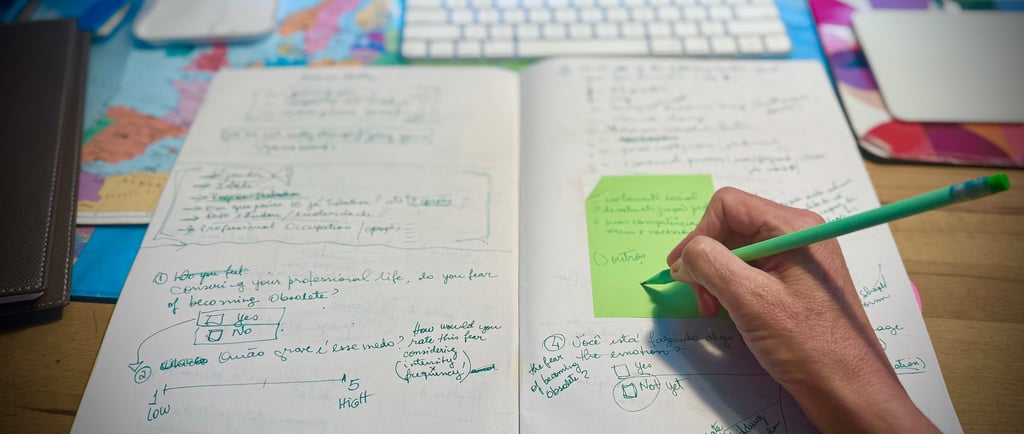Why Your Brain Needs You to Pick Up a Pen
We spent 5,500 years perfecting handwriting, and now we're just... letting it go. Turns out, writing by hand isn't just old-school; it actually makes your brain work better. We are losing this skill, and our brains are paying the price.
CREATIVITYIDEASFUTURES THINKING
Ligia Fascioni
10/5/20253 min read


Right now, millions of people are typing, swiping, and talking to their devices—but barely anyone is writing by hand anymore. And here's the thing: we might be losing something crucial in the process.
Before you continue reading, I have a small request: grab a pen (or pencil) and a notebook (or any piece of paper). Trust me on this one—you'll see why in a minute.
Seriously though, when was the last time you actually took notes by hand? An ability that humans spent 5,500 years developing is quietly disappearing, and the cognitive consequences are more serious than you might think.
THE BRAIN-HAND CONNECTION
Here's what the science tells us: brain waves associated with memory and information processing are significantly stronger when we write by hand compared to typing. And when you consider that many people don't even type anymore—they just dictate messages or send voice notes—the implications become even more concerning.
Research consistently demonstrates that handwriting improves spelling accuracy, memory recall, cognitive development, and conceptual understanding. But here's the really exciting part: neuroscientists have found that the neuromuscular activity involved in handwriting actually stimulates creativity and enhances both reading and critical thinking skills.
When we "think with our hands," we process information in a more creative and deliberate way.
The slower pace gives us time to contemplate our ideas, connect them to emotions and memories, and even reduce stress. This focused process can help us overcome creative blocks in ways that typing simply doesn't.
Even doodling — those seemingly random shapes and patterns you draw during meetings — can unlock creative potential and help you visualize solutions to complex problems.
THE COST OF GOING DIGITAL
Generation Z (born between 1997 and 2012) is the first generation of true digital natives. For them, keyboards and touchscreens aren't just alternatives to handwriting — they're the default. And while they've gained impressive digital skills, many studies suggest they're struggling with or have lost the ability to write by hand competently.
The trade-off isn't trivial. When handwriting skills decline, so do the cognitive benefits that come with them: stronger memory formation, better reading comprehension, and enhanced critical thinking. On a practical level, this can manifest as illegible handwriting, weaker fine motor skills, and difficulty expressing complex thoughts in a clear, organized way.
BRINGING HANDWRITING BACK INTO YOUR LIFE
The good news? You don't need to abandon your devices entirely. Small, consistent practices can help you maintain this valuable skill and reap its cognitive benefits:
Get into the habit of "thinking with your hands." When you're facing a problem, grab paper and sketch it out. Draw diagrams, write down the issue, brainstorm solutions visually. The act of moving pen across paper engages your brain differently than staring at a screen.
Take handwritten notes during meetings, classes, or any situation requiring focus. You'll retain more information and stay more engaged. And yes, doodling in the margins absolutely counts — it's not distraction, it's cognitive processing.
Carry a small notebook everywhere. Use it to capture ideas, observations, to-do lists, or anything worth remembering. You'll be amazed at what surfaces when you slow down enough to write it out.
Make it enjoyable. Invest in pens that feel good to use and notebooks that make you want to write. When handwriting becomes pleasurable rather than a obligation, the habit sticks.
So here's my challenge: put down your phone for a moment and write something by hand today. It doesn't have to be profound — just a few sentences, a quick list, or even some random doodles. Your brain will thank you.
What are your thoughts? Do you still write by hand regularly, or have you gone fully digital? Share your experience in the comments below!
